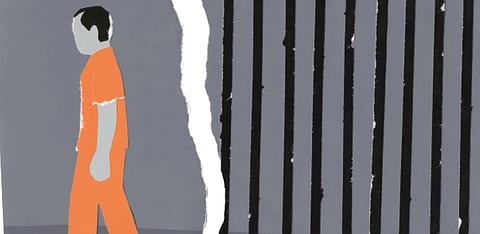

In an unusual turn of events, the father of a victim in a honour killing case pleaded with his counsel not to ask the court to impose the death sentence on the convicts, displaying a rare sense of magnanimity.
——
ON June 8, a division bench of the Madras High Court, comprising Justices P.N. Prakash and A.A. Nakkiran commuted to life imprisonment the death sentence awarded to the brother of a deceased woman, Kannagi, in the Kannagi-Murugesan honour-killing case. The decision came in response to an appeal filed against the 2021 judgment of the Cuddalore District Special Court that imposed a death sentence on the woman victim's brother, and a life sentence on twelve others, charged under the Sections 120B (punishment of criminal conspiracy), 302 (punishment for murder), 147 (punishment for rioting), 347 (wrongful confinement to extort property, or constrain to illegal act) and 364 (kidnapping or abducting in order to murder) of the Indian Penal Code ('IPC'), and Sections 3(1)(x) and 3(2)(v) of the Scheduled Caste and Scheduled Tribes (Prevention of Atrocities) Act, 1989 ('SC/ST Act'). The case was investigated by the Central Bureau of Investigation.
As per the prosecution, on July 8, 2003, Murugesan, belonging to a Scheduled Caste, and Kannagi, from the Vanniyar Community, were forced to consume poison and their bodies were burned. The case came to be termed as an 'honour-killing', since they had been killed for marrying out of caste. The Special Court (or the Principal Sessions Court), Cuddalore district sentenced the brother of the girl to death, and awarded life imprisonment to her father and nine other people. In an unusual development, two senior police officers were also convicted by the trial court for life imprisonment under Sections 3(2)(i) and 4 (punishment for neglect of duties) of the SC/ST Act.
The Madras High Court, via its judgment delivered yesterday, commuted the death penalty imposed on the brother of deceased Kannagi and imposed life sentence instead. The high court confirmed the conviction and life sentence imposed on her father and seven other persons belonging to her same caste. Two other convicted persons were acquitted.
Of the two police officers convicted by the trial court, the then Sub Inspector of Police was acquitted of committing offences under section 3(2)(1) of the SC/ST Act, under which life sentence was imposed, and Section 218 (public servant framing incorrect record or writing with intent to save person from punishment or property from forfeiture) of the IPC, under which three years rigorous imprisonment was imposed. However, his conviction under Section 217 (public servant disobeying direction of law with intent to save person from punishment or property from forfeiture) of the IPC of two years imprisonment, and section 4 of the SC/ST Act of one year imprisonment were sustained.
The conviction and life sentence of the second police officer, the senior of the two officials who was a Deputy Superintendent of Police ('DSP') at the time of his retirement, were upheld.
This judgment is a very important victory for Dalit justice and rule of law, observers have said.
Police officials are seldom punished for mistreating Dalits. The confirmation of conviction under section 3(2)(i) of the SC/ST Act, and the life imprisonment awarded to the DSP is perhaps unprecedented in India, or at least amongst the few such instances. Conviction under section 4 of the SC/ST Act is also rare. It is, therefore, a major step forward to ensure justice for victims of honour killing.
Dr.V. Suresh, had appeared for the family of Murugesan, the Dalit man killed for daring to marry a caste Hindu girl. After consulting with the family of the deceased Murugesan, he informed the court that the family had instructed him that they were not pressing for confirmation of the death sentence, and would be satisfied with confirmation of conviction and award of life sentence.
Dr. Suresh told The Leaflet:
"I was actually very humbled by the response of the father of Murugesan, a landless Dalit person, economically very poor, when I asked him about the death sentence. He spontaneously responded in very rustic Tamil, 'Ayya, (respectful address, in Tamil) I have lost my son and daughter-in-law to the most brutal killing arising from caste poison and hatred; they are not going to come alive because the killers are going to be hanged. I can imagine the pain of the family whose member will be hanged because of the death sentence. Let them not suffer that pain of permanent departure. The person and his family have already paid the price because of conviction and imprisonment. I don't want more blood to be spilt.'
I wonder how many of us will have this generosity of spirit!"
Dr.Suresh, who is National General Secretary at the People's Union for Civil Liberties ('PUCL'), a reputed human rights body, further said:
"At the risk of sounding prescriptive, there are a number of very progressive provisions in the SC/ST (Prevention of Atrocities) Act, 1989, which are very useful to get social justice. But they are not known to many lawyers, let alone other human rights activists.
We, in the PUCL should organise a series of workshops to educate our members and activists of other movements on the unique provisions of the SC/ST (POA) Act, and on how to access the various protections given in this law to protect, promote and defend the rights of Dalits and tribals. For example, the provision of State giving compensation on the filing of a FIR under the law, in instalments from the time of filing FIR, final report/chargesheet, trial and judgment is unique as compensation is delinked from the trial court judgment; this is in recognition that trials are not in the hands of victims and so they need to get compensation at the beginning itself.
The POA Act also has provisions for appointment of lawyers of choice of the victims. There are other very unique provisions also".
Click here to view the Madras High Court's full judgment.